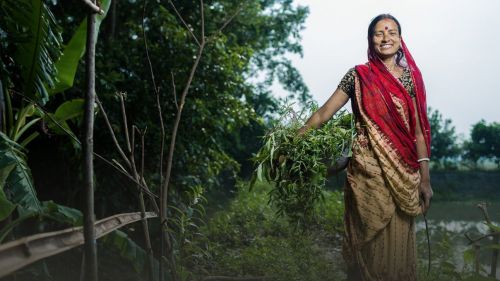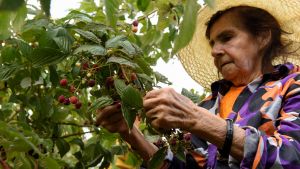Women's Work, African Swine Fever Ripples, & Urban Growing

Catch the week's top news and research in food, agriculture, and global development in our Global Food for Thought news brief.
Top Story
Honoring Women's Work
This week marked the 46th International Women’s Day as celebrated by the UN, and the 112th since its first recorded observation. The day is vital to agriculture. Women make up almost half of the agricultural workforce in lower income countries, with a fair amount of variation at the country level. For example, three quarters of rural women in India work in agriculture full-time. Thousands of these women joined ongoing demonstrations at their nation’s capital. But women’s labor does not end when they leave the field. Women face added burdens of housework and childcare, both of which have intensified during the COVID-19 pandemic.
The unique and layered expectations placed on women, as well as the numerous and intersecting barriers they face, make it imperative that researchers, implementers, and policy makers include women and center their needs in program and policy design. For example, a cropping technique promoted by the Innovation Lab for Integrated Pest Management both improves the yields of crops grown by women and provides nutritious fodder for the livestock they manage. Efforts such as these will be critical moving forward. Pandemic recovery will not be successful if it leaves women behind.
Council Insights
Talking Back to Hunger
Food insecurity has skyrocketed during the COVID-19 pandemic. In the US, lines at food banks have grown longer and longer as federal relief debates dragged on. It is all too easy to lose sight of the human experience of hunger in the midst of all the policy debates. In his latest blog, Roger Thurow shares a poem by Aaron Whitehead that highlights the personal, human experience of food insecurity.
Food & Agriculture
Opinion - The Root of It
The seeds of India’s now six-month-long farmer protest can be found in the Green Revolution, argues a piece in Foreign Policy. The wildly successful crops from that era came with ecological costs and over production. As Indian farmers anticipate diversifying their crops, they want the governments support and subsidy, and fear that the new laws would force them to bear the full costs of the transition.
Going Public
Food and agritech companies are starting to turn to public capital over private investments. A rising sustainable investment trend is fueling the move. Public investment comes with risk, however: several companies have seen increased volatility and lower valuation.
Fever Ripples
More than half a million pigs were culled in Russia this week in attempts to contain African swine fever (ASF). Neighboring China is intensifying its crackdown on illegal vaccines for the virus, which are thought to cause a new, chronic form of the illness. Meanwhile, a yet to be peer-reviewed analysis alleges a connection between the 2019 outbreak of ASF and the spillover of Sars-CoV-2 into humans.
Deeper Dive
The History of Honoring Women
International Women’s Day (IWD) has its roots in North American and European labor movements. The Socialist Party of North America organized first National Women’s Day on February 28, 1909. A 1917 women’s strike in Russia helped cement the current IWD date—the strike took place on the last Sunday in February of the Julian calendar, which corresponded to March 8 on the Gregorian calendar used by much of the rest of the world.

A woman harvest raspberries on a farm near Chillan, Chile.
Data Crunch
Food Systems Supply GHGs
A new study has found that food systems, including agriculture, processing, inputs, and distribution, account for one third of global anthropogenic greenhouse gas emissions. The study makes use of the EDGAR-FOOD data base, which contains data series on multiple sectors going back to 1990. Production stages, including inputs like fertilizers, are the leading contributor to food systems emissions, with land use and distribution close behind.
Resilience
Pioneering Mushrooms
A man is pioneering mushroom farming in landlocked Afghanistan, where seeds are typically imported. Rasool Rezaie learned the practice in Russia, where he sought asylum. After his application rejection and subsequent deportation, Rezaie continued growing mushrooms. He now supplies spores to others hoping to enter the field.
Big Ideas
Growing Urban Survival
A community farm in Rio de Janeiro is helping more than 800 families survive the economic hardship of the COVID-19 pandemic. Horta de Manguinhos is a community-led initiative founded to solve food insecurity among the poor by training workers to practice community farming. Workers take home enough food for their families, distribute part of the produce to at-risk members of the community, and sell the rest to commercial distributors.
DC Report
Lunch Period Extended
The USDA has extended waivers that allow school children to receive nutritious meals throughout the summer. Previously only extended through June 30th, the waivers are now available through September 30th. The waivers also allow for summer meal programs to be served in all areas, meals to be served outside of regular group settings and times, and allow guardians to pick up several days’ worth of meals for their children.
Big Actors
Stocking Up
For the first time in eight years China’s wheat carryout is set to fall. The country has more than a year’s worth of supply in storage, however. Only a small percentage of China’s wheat needs will be met by imports, but the USDA has already bumped its import projections up to a 25-year high, 10.5 million tons.
Trade & Commodities
Pork on Pause
The outbreak of the African swine fever in 2019 devastated the backyard farms in the Philippines and led to a sharp soar in pork prices, up to more than double the normal prices. The government imposed a 60-day price cap on pork in early February and increased quotas for pork imports. In response, retailers in Manila went on a two-week “pork holiday” and refused to sell the meat.
Upcoming Events
Strengthening the Transatlantic Cooperation for Research and Innovation in the Agri-Food System
Date: March 18
Time: 4:30 p.m. CET
FFA 2021 Annual Conference – Food System Renewal
Date: March 23
Presidents United to Solve Hunger (PUSH) Leaders Forum
Date: March 23-24
Universities Fighting World Hunger Summit
Date: March 25-26

